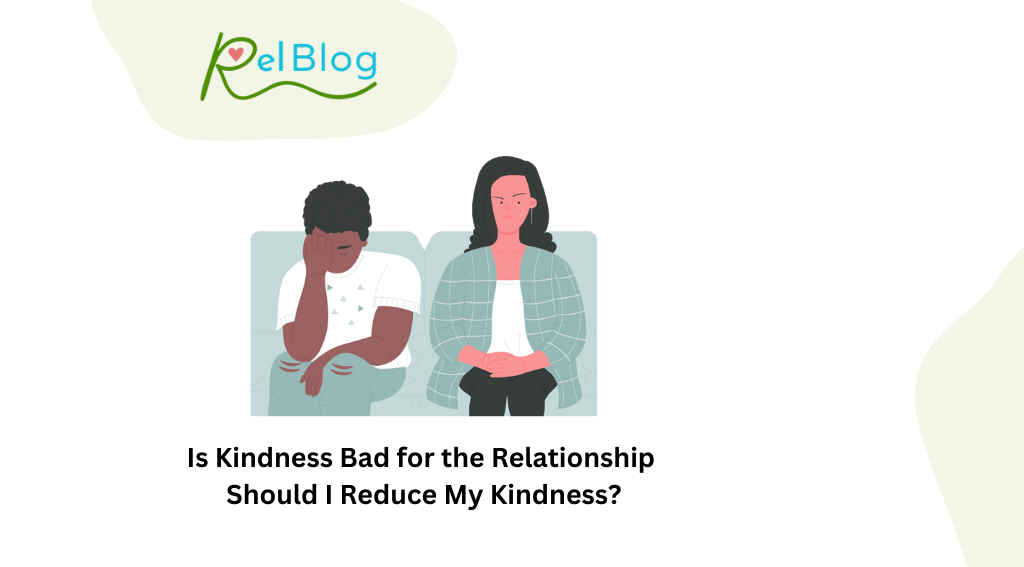Kindness is frequently praised as a crucial component for fostering love and strong connections in the world of relationships. Could an excessive amount of kindness actually cause more harm than good? Should we be concerned about how much kindness we show in relationships? In this article, we’ll look at the potential negative effects of kindness on relationships and whether it’s worthwhile to rein in kindness.
Excessive kindness in a relationship: Its Potential Drawbacks
You may ask your self Is being too kind bad for relationships? Should I be less kind? Kindness is typically valued as a valuable quality in any relationship. It encourages partner love, comprehension, and harmony. However, when kindness is overdone, it may unintentionally cause problems that can affect a relationship’s overall dynamic. To keep a strong and balanced connection, it’s critical to acknowledge and address these potential drawbacks.
Lack of Communication: Excessive kindness may unintentionally impede partners’ ability to communicate effectively. A power dynamics imbalance can result from one person consistently prioritizing the needs and desires of the other, which can deter open and honest dialogue. This could eventually result in unspoken concerns, resentment, or problems that remain unresolved.
Dependency Problems: Sometimes excessive kindness can be accompanied by an excessive reliance on just one partner. Having someone take care of your needs all the time can be comforting, but it can also lead to dependency. This might restrict personal development and stop people from creating their own identities apart from relationships.
Unhealthy Boundaries: Setting and upholding healthy boundaries may be difficult if you are overly kind. The distinctions between personal spaces and individual identities can be muddled by constantly prioritizing a partner’s needs and wants. Finding a balance between autonomy and self-care within the relationship is essential.
Key Takeaways: While showing kindness in a relationship is crucial, doing so too frequently can have unintended negative effects. To ensure a well-rounded and fruitful partnership, it’s crucial to uphold open communication, promote independence and personal development, and set healthy boundaries.
The Value of Assertiveness, Finding a Balance
A crucial ability is assertiveness, which enables people to effectively express their needs, viewpoints, and boundaries while respecting other people’s rights and feelings. Being assertive allows people to express themselves confidently and authentically while striking a balance between being passive and aggressive, which promotes better relationships and personal development.
The capacity to express one’s thoughts and feelings clearly and directly is a crucial component of assertiveness. We can prevent misunderstandings and make sure that our message is effectively “understood” by speaking calmly and honestly. This includes using “I” statements to express our feelings and thoughts without blaming others. A safe environment for open dialogue and mutual understanding is fostered by being assertive in our communication.
Additionally, being assertive entails establishing and upholding personal boundaries. It gives us the ability to set boundaries for what we consider acceptable and respectfully express those limits. We protect our well-being and stop others from taking advantage of us by defining our boundaries. Additionally, being assertive entails saying “no” when necessary and standing up for our rights without feeling guilty or worried about upsetting others.
In the end, developing assertiveness calls for self-awareness and practice. Finding a balance between complacency and aggression, allowing us to speak for ourselves while still taking into account other people’s needs and feelings, is the key. The foundation for healthier and more fulfilling relationships is laid by practicing assertiveness, which not only improves our self-esteem and confidence.
Key Takeaways
- Effectively expressing needs, opinions, and boundaries while respecting others is the goal of assertiveness.
- In order to be assertive, prevent misunderstandings, and promote mutual understanding, communication must be clear and direct.
- A crucial component of assertiveness is establishing and upholding personal boundaries, protecting our wellbeing, and preventing exploitation.
- Assertiveness cultivates self-esteem and contributes to healthier relationships by striking a balance between passivity and aggression.

Understanding the distinction between kindness and pleasing people
On the surface, kindness and pleasing others may seem similar because both involve doing good deeds for others. However, it is essential to understand that the two are very different from one another. Greater relationships and a sense of self-authenticity can be cultivated by comprehending this disparity.
Kindness:
- comes from a place of sincere empathy and compassion for others.
- is distinguished by deeds of kindness, compassion, and assistance.
- is motivated by the desire to have a positive impact without expecting anything in return.
- is grounded in reality and stays true to one’s principles and limits.
People are pleasing:
- stems from a need for validation from others or out of fear of rejection.
- involves giving up one’s own needs and desires in order to win approval or stay out of trouble.
- is frequently motivated by a deep-seated desire to be liked or accepted by others.
- may cause resentment, burnout, and unhappiness in interpersonal relationships.
While being kind fosters positive relationships and genuine concern for others, pleasing others can have a negative impact on one’s emotional health. We can navigate our interactions more mindfully and make sure that our actions are in line with our true intentions and values by understanding the difference between the two.
Key Takeaways
- People who are pleasing are motivated by their need for approval and their fear of being rejected, whereas kindness comes from compassion and authenticity.
- Kindness promotes better relationships, whereas pleasing others can cause burnout and resentment.
- We can prioritize our own well-being and keep genuine connections with others by being aware of the differences between the two.
How Exaggerating Kindness Can Impact Relationship Dynamics
It’s common to think that having generosity and kindness toward others is a good quality. It fosters community, strengthens bonds, and encourages goodwill. However, when kindness is overdone and taken too far, it can have an unexpectedly negative effect on relationship dynamics.
Here are some ways that showing too much kindness can have an impact on the dynamics of relationships:
- Unbalanced power dynamics: When one person consistently goes above and beyond in their kindness, this can lead to a power imbalance in the relationship. While the other person becomes dependent or passive in receiving, the overextender may unintentionally take on the role of the caretaker or the one who is constantly giving.
- Overextending kindness can result in unspoken expectations and feelings of resentment. It can be frustrating to constantly put others’ needs before one’s own, especially if it seems like the effort isn’t being recognized or valued.
- Loss of identity: Sometimes, showing too much kindness can cause one to lose their sense of self and identity. Prioritizing personal growth or pursuing one’s interests and passions can be difficult when one is constantly concerned with taking care of others.
- Communication breakdowns: In some circumstances, showing too much kindness can obstruct honest, open communication. The overextender may be unable to express their own needs, desires, or concerns out of fear of upsetting or disappointing others, which could result in a breakdown in effective communication.
Keep in mind that while kindness is important, it’s also important to maintain healthy interpersonal dynamics. To promote a mutually satisfying and fulfilling relationship with others, it is essential to find the right balance between giving and receiving.
Key Takeaways
- Overextending kindness can create unbalanced power dynamics within a relationship.
- Unspoken expectations and feelings of resentment can arise from consistently putting others’ needs before one’s own.
- Overextending kindness may lead to a loss of personal identity and hinder communication.
- Striking a balance between giving and receiving is essential for maintaining healthy relationship dynamics.
Getting Over the Fear of Relationship Conflict
Conflicts will inevitably arise in any relationship at some point. However, a person’s fear of conflict may occasionally prevent them from expressing their true emotions and needs, which can result in unresolved problems and escalating resentment. To encourage healthy communication and keep a strong bond with your partner, it’s crucial to overcome this fear.
1. Recognize the underlying beliefs: Negative beliefs about confrontation, such as the worry of being rejected or judged, frequently give rise to a fear of conflict. Spend some time determining the validity of these underlying beliefs. Keep in mind that healthy conflict can make a relationship stronger.
2. Practice effective communication: To overcome a fear of conflict, one must develop strong communication skills. Learn to share your thoughts and feelings in a calm, confident manner by using “I” statements. To truly comprehend your partner’s perspective, practice active listening as well.
3. If necessary, seek professional assistance: It may be beneficial to seek the advice of a therapist or counselor if your relationship is severely impacted by your deep-seated fear of conflict. They can give you the resources you need to successfully manage conflicts and help you understand the causes of your fear.
4. Building trust with your partner is essential for overcoming the fear of conflict. Make a safe, non-judgmental environment where you can both feel at ease speaking openly. Keep in mind that conflicts pose less of a threat to the relationship and more of an opportunity for development and understanding.
Key Takeaways: Recognize and refute unfavorable notions about interpersonal conflict. Acquire active listening and effective communication skills. If you have a strong fear of conflict, think about getting professional assistance. To encourage healthy conflict resolution, nurture trust and safety in the relationship.

The importance of kindness and self-care in establishing healthy boundaries
Kindness and self-care are essential when it comes to establishing healthy boundaries in our lives. Boundaries serve as rules that assist us in defining our boundaries and safeguarding our wellbeing. By being kind to ourselves, we recognize the value of our needs and emotions, and self-care gives us the freedom to put our mental, physical, or emotional well-being first. A strong foundation for establishing and upholding healthy boundaries is built on kindness and self-care.
Here are a few important things to think about:
- Understanding your values: Consider what matters to you, the beliefs that guide your life, and how establishing boundaries complies with these values. You can set boundaries that are consistent with your core values with the aid of this awareness.
- Recognizing your limitations: Be open and honest about your abilities, feelings, and energy. You give yourself the power to set boundaries that safeguard your wellbeing and avoid burnout by accepting your limitations.
- Communicating assertively: Self-care and kindness can complement assertive communication. You can express your needs, establish clear boundaries, and kindly advocate for yourself while respecting both your own and other people’s boundaries by being assertive.
- Learning to say no: Saying no is a selfless act that shows kindness to both yourself and others. Recognize that by declining, you are putting your own well-being first and making room for positive relationships.
We give ourselves the power to establish and uphold healthy boundaries that encourage personal development and fulfillment by practicing self-care and being kind to ourselves. Keep in mind that creating healthy boundaries is a continuous process that calls for patience, self-reflection, and practice.
Key Takeaways
- Setting healthy boundaries requires a lot of kindness and self-care.
- Establishing boundaries that follow your core principles is facilitated by knowing your values.
- To avoid burnout and safeguard your wellbeing, be aware of your limits.
- To express your needs and respect other people’s boundaries, communicate assertively.
- Saying no is a kind deed that prioritizes your well-being and is done for both yourself and others.
- To empower yourself in establishing and upholding healthy boundaries, embrace kindness and self-care.
The Secret to Maintaining Kindness in Relationships: Self-Compassion
We frequently concentrate on the actions we take toward others when it comes to preserving good and healthy relationships. We must not, however, overlook the significance of self-compassion in this situation. Self-compassion is essential for maintaining kindness in our relationships as well as for our own well-being.
Self-compassion begins by recognizing and accepting our own shortcomings. It entails being as kind, understanding, and forgiving to ourselves as we are to others. We are better able to demonstrate empathy and compassion for our partners, friends, and loved ones by practicing self-compassion.
We can build a solid foundation of love and understanding within ourselves by accepting self-compassion. Without endangering our own well-being, it enables us to establish positive boundaries, communicate effectively, and offer support. We become more resilient and better able to maintain kindness in all of our relationships by putting our own self-care and acceptance first.
Key Takeaways
- Self-compassion is essential for preserving good and healthy relationships.
- It entails being kind and understanding to ourselves while acknowledging and accepting our own shortcomings.
- Setting healthy boundaries and prioritizing self-care are both made possible by practicing compassion for oneself, which helps to promote long-lasting kindness in relationships.
Honesty and communication are crucial components of building relationships.
It takes more than just spending time together to develop and nurture healthy relationships. Honesty and communication are two essential components that are the cornerstones of any successful relationship. These crucial tools forge strong bonds, foster trust, and guarantee a positive interpersonal dynamic.
Any meaningful relationship is built on honesty. It necessitates the willingness to be honest, open, and sincere with one another. We create a setting where trust can flourish and develop by embracing honesty, opening the door for stronger connections. Being honest with ourselves and those we care about creates a lasting, genuine connection.
The key to understanding, empathy, and harmony in relationships is communication. Active listening, sharing ideas and emotions, and effective self-expression are all part of it. We avoid misunderstandings, resolve conflicts, and have a deep level of connection with our friends, family, or partners through effective communication. It gives both parties the opportunity to respectfully and openly express their needs, desires, and expectations.
Key Takeaways
- Honesty lays the groundwork for trust and authenticity in relationships.
- Communication is crucial for understanding, empathy, and resolving conflicts.
- By prioritizing these two essential tools, we can nurture and strengthen our relationships.
Recognizing and appreciating your own needs in a relationship
Prioritizing your partner’s needs over your own can be simple when you’re in a relationship. It’s crucial to understand and value your own needs, though. Here are a few methods:
- Self-reflection: Spend some time considering your own emotions, goals, and limitations. You can effectively communicate your needs if you know what you really need from the relationship.
- Open communication: Discuss your needs honestly and openly with your partner. Your partner will be able to understand and support you if you express your feelings and expectations in a clear manner.
- Set boundaries: Maintaining healthy boundaries is essential for preserving emotional health. Make sure that your needs are respected by being clear about your boundaries and being assertive when enforcing them.
- Prioritize self-care and set aside time for activities that make you happy and fulfilled. It will be advantageous for you to take good care of yourself on a physical, emotional, and mental level as well as for the relationship.
Remember that both partners must be aware of and appreciative of one another’s needs in order for a relationship to be successful and fulfilling. Accepting your unique needs in a relationship helps you grow as an individual and strengthens your bond with your partner.
Key Takeaways
- To better understand your own needs in the relationship, practice self-reflection.
- Discuss your needs with your partner in an open and sincere manner.
- Set limits to ensure your needs are met and emotional well-being is maintained.
- To nurture both yourself and the relationship, put self-care first.

Strategies for Reducing Excessive Kindness Without Endangering Relationships
While being kind is typically a good quality in relationships, being too kind can occasionally result in dependency and imbalance. Maintaining a healthy balance while preserving your relationship with your partner or loved ones is crucial. Here are some methods for reducing excessive kindness without endangering the relationship:
- Establish Boundaries: To prevent taking on more responsibilities or sacrificing your own needs, it’s important to establish boundaries. Discuss your comfort zone and the level of kindness you are willing to extend with your partner in an open and honest manner.
- Encourage Independence: Encourage your loved ones to be independent and accountable for their own actions rather than constantly intervening to resolve issues or handle situations. This gives you the chance to take a step back and concentrate on your own well-being while allowing them to develop self-reliance.
- Prioritizing self-care is crucial when reducing excessive kindness. Spend some time reviving and nurturing your own physical and emotional health. You’ll have more energy and emotional capacity to contribute to the relationship if you take care of yourself.
- It’s crucial to express your feelings to your partner in an open manner. Discuss how you two can cooperate to achieve a healthier balance and express your concerns about the excessive kindness. A strong and successful relationship must be maintained through open and honest communication.
Remember that being unkind is not necessary when you reduce excessive kindness. Finding a healthy balance that honors both your needs and those of your loved ones is the key. You can create a stronger and more fulfilling connection in your relationship by striking this balance.
Key Takeaways: Establish clear boundaries, encourage independence, prioritize self-care, and communicate openly about your feelings to reduce excessive kindness without harming the relationship.
Lastly
kindness fosters love, understanding, and empathy and is a crucial component of any relationship. While it’s understandable to doubt and assess our actions, we must be mindful of how kind we are to our spouses and other loved ones. It’s important to maintain a balanced perspective on kindness. A healthy and fulfilling relationship depends on us being kind to both ourselves and others. Kindness can foster communication, strengthen bonds, and foster harmony in the environment. However, maintaining a sense of self-respect and being aware of boundaries is crucial. Kindness should never entail compromising our needs or sacrificing our own happiness.
Open and honest communication is necessary for healthy relationships because it acknowledges and respects both partners’ needs and kindness. We sincerely hope that the information in this article has helped you strike a balance between kindness and selflessness in your relationships. Keep in mind that every relationship is different, so what works for one person might not work for another. Once again, we appreciate you selecting RelBlog. In order to help you on your journey toward happier and healthier relationships.

